Politics
Türkiye eyes ‘Century of Turkic World’: AK Party Deputy Chair
Under Türkiye’s leadership, the region is moving toward a century of broader Turkic world influence, Kürşad Zorlu, deputy chair of the ruling Justice and Development Party (AK Party) and head of relations with Turkic states, said Thursday, outlining an ambitious new phase in Ankara’s foreign policy.
Addressing the Turkic World Consultation Meeting, which convened civil society leaders from across Turkic nations, Zorlu described the growing institutional, economic and cultural integration among Turkic states as a “diplomatic success.”
He emphasized that Türkiye sees this emerging unity not merely as a geopolitical strategy, but as a moral and historical responsibility rooted in shared ancestry, language and cultural memory stretching from Central Asia to the Balkans.
“The Turkic world is not a geographical border but an atlas of hearts,” Zorlu said.
Zorlu credited the 2021 Istanbul summit with turning what was once a vague ideal into a functional international entity: the Organization of Turkic States (OTS). “This is not an ordinary organization,” he said. “It has moved from a speculative concept to a recognized international institution with nearly 34 areas of cooperation.”
Among these fields are energy, trade, defense, technology, innovation, transportation, cultural diplomacy and academic exchanges – all identified as priority areas in this new phase of regional engagement.
Zorlu lauded the contributions of national leaders in institutionalizing the OTS, especially Erdoğan, whose vision he said continues to guide Türkiye’s proactive stance in the Turkic world.
Regional power center
Zorlu drew attention to the growing economic potential of the Turkic world and its strategic location at the heart of global production and trade routes.
“Today, the Turkic states have surpassed a combined production volume of $2 trillion, positioning themselves among the world’s 10 most influential economic regions,” he stated.
He emphasized the critical importance of the region’s geographical positioning, surrounded by major economic powers: China to the east, the Middle East and India to the south – with a combined production exceeding $6 trillion –and the European Union and Russia to the west and north, respectively.
“Approximately $50 trillion in production capacity encircles the Turkic world, underscoring its central role in global economic dynamics,” Zorlu remarked.
Zorlu emphasized the Middle Corridor as a vital transit route, stretching from the Zangezur Corridor through the Caspian Sea to China’s western borders and onward to Europe. He said the corridor now commands a potential $600 billion trade capacity, embedding the Turkic world deep into the global trade matrix.
He argued that the Turkic region’s integration is not solely political or economic, but increasingly cultural and social. “Education programs, academic partnerships, and cultural exchanges are no longer optional; they are essential pillars of Turkic integration,” he said.
Zorlu placed special emphasis on civil society, calling NGOs and grassroots movements “the most vibrant colors on the atlas of hearts.” He announced Türkiye’s intention to launch a regional civil society network under Erdoğan’s auspices to increase people-to-people ties.
“We must create a civil society cooperation network that will announce itself first to the Turkic world, then to the world at large,” he said.
He also stressed the strategic importance of shared cultural and educational efforts: “Turkic integration must rest on not only political and economic foundations, but also on social and cultural ones.”
Zorlu called for developing the institutional capacity of Turkic NGOs, ensuring they work in coordinated platforms to foster lasting integration. “We are no longer a community reacting to someone else’s script. We are writing our own,” he said.
Defense, Technology
Highlighting Türkiye’s recent strides in national defense – including the rollout of the Kaan national combat aircraft, soon to be exported to Indonesia –Zorlu said defense cooperation has become a beacon for Turkic unity.
He noted that this excites not only governments but also citizens across the region, calling it a “shared pride” and proof of the Turkic world’s capacity for indigenous innovation.
Zorlu concluded by asserting that the Turkic world vision transcends partisan boundaries. “The Turkic world is a matter above politics,” he said. “It is a historical responsibility, and under President Erdoğan’s leadership, we are marching steadily toward the ‘Century of the Turkic World.’”
He added: “We are strong together. We grow together. And we will triumph together.”
Formally established in 2021, the Organization of Turkic States includes Türkiye, Azerbaijan, Kazakhstan, Kyrgyzstan and Uzbekistan as full members. Hungary and Turkmenistan participate as observers. The OTS has increasingly sought to institutionalize cooperation in various fields, framing itself as a cultural, economic and strategic alliance rooted in shared identity and geopolitical interests.
Zorlu’s remarks reflect a wider regional ambition to not only deepen intra-Turkic ties but also to position this bloc as a critical actor in Eurasia’s evolving power architecture.
Politics
Azerbaijan, Armenia leaders to meet in Washington for peace talks
U.S. President Donald Trump will host the leaders of Armenia and Azerbaijan for peace talks at the White House on Friday, a U.S. official said on Thursday.
The official told Reuters it was possible that the framework for a peace agreement could be announced at Friday’s meeting. The Washington Post was the first to report on the talks.
Armenia also confirmed the talks. The trilateral meeting is “aimed at promoting peace, prosperity and economic cooperation in the region,” the government said in a statement posted on its Telegram messaging app.
Armenian Prime Minister Nikol Pashinyan, who is travelling to Washington on Aug. 7-8, will also hold a bilateral meeting with Trump, the statement said.
In March, the two sides announced that they had agreed on the text of a draft peace agreement; however, progress has been sporadic and slow since then. The countries’ leaders met in July in Abu Dhabi for talks. Azerbaijan has previously said that Armenia must change its constitution to remove indirect references to Karabakh’s “independence” before signing a peace treaty. Yerevan denies this, but Pashinyan has repeatedly stressed, most recently this week, that the South Caucasus country’s founding charter needs to be updated.
Relations between Baku and Yerevan have been tense since 1991, when the Armenian military occupied Karabakh, a territory internationally recognized as part of Azerbaijan and seven adjacent regions, including Lachin.
Most of the territory was liberated by Azerbaijan during a 44-day war in the fall of 2020, which ended after a Russian-brokered peace agreement that opened the door to normalization talks and the demarcation of their border.
After a series of slow-moving negotiations, Azerbaijan rushed in troops last year in September and swiftly seized back Karabakh, whose entire population of nearly 120,000 people returned to Armenia after rejecting a reintegration program Baku offered.
Earlier in 2024, Armenia withdrew from several Azerbaijani villages it had controlled since the early 1990s as part of the peace process.
Politics
AK Party launches campaign for Century of Türkiye, terror-free plan
Two deputy chairpersons of the ruling Justice and Development Party (AK Party) held a news conference on Wednesday in Ankara to introduce a new campaign that will continue until September. The campaign is entitled “Century of Türkiye Meetings” and aims to promote the titular set of reforms unveiled by President Recep Tayyip Erdoğan ahead of the centenary of the Republic of Türkiye in 2023. In addition, the meeting will bring together AK Party staff from 81 provinces and the public as part of an outreach effort about the terror-free Türkiye initiative.
Ahmet Büyükgümüş, deputy chairperson of the party, said they attach importance to communicating with the public about the services that AK Party governments have provided since they first came to power in 2002. “We will launch a series of events throughout August and September about what is done with the vision of Century of Türkiye in 81 provinces and 973 districts,” he said.
“Century of Türkiye” is a comprehensive list of goals aimed at boosting Türkiye’s global standing, encompassing reforms in public services, health care, education, transportation, energy, agriculture and tourism, as well as targets to enhance the country’s diplomatic influence in global affairs.
The party’s deputy chairs and ministers will lead AK Party delegations to events held in provinces and districts and they will also meet with opinion leaders in each province. The campaign will conclude with a final event in Istanbul, attended by representatives of nongovernmental organizations (NGOs).
“We are engaged in politics at a time of a very important agenda for Türkiye and a significant transformation in the world. Therefore, developments regarding the terror-free Türkiye initiative and its details will be shared with our nation. We will conduct field trips to explain its meaning and how the initiative will advance,” he said.
The terror-free Türkiye initiative launched by government ally Nationalist Movement Party (MHP) leader Devlet Bahçeli had its first tangible progress in February when the terrorist group PKK’s jailed ringleader, Abdullah Öcalan, accepted Bahçeli’s call and urged the group to lay down its weapons. In May, the PKK announced it would dissolve itself. Last month, some 30 PKK members, including a senior leader, burned their weapons in a ceremony in northern Iraq. Although symbolic, the gesture marked the first time that the group had laid down arms in its campaign of violence for more than four decades. The PKK has previously announced so-called unilateral truces but has never entirely given up its ambitions.
On Tuesday, a parliamentary committee established exclusively to tackle the initiative held its first meeting, marking another milestone in the process. The committee will examine the fine details of the initiative and provide recommendations to Parliament on advancing the initiative with new regulations. This may or may not include lenient sentences for former members of the terrorist group and a legal framework regarding the status of the terrorist group.
As part of the campaign, the AK Party’s women’s branch will visit families of terror victims and veterans of counterterrorism operations, presenting a letter from President Erdoğan addressed to them in the context of the terror-free Türkiye initiative.
Büyükgümüş said they would also inform the public on the government’s efforts to ensure a permanent drop in inflation. “Under the leadership of President Erdoğan, all relevant ministries endeavor to maintain a fall in inflation and improve welfare. As AK Party cadres, we will inform the public about the point we reached on this matter and future steps,” he said. Inflation dropped more than expected in July to reach its lowest level in almost four years, according to official data released on Monday, which officials say reinforces their forecasts that price growth will slow further by year-end. The increased cost of living and instances of overpricing by certain businesses are major economic challenges for the country, and some political pundits attribute this to the drop in votes for the AK Party in the 2024 municipal elections.
He stated that they would also share details of the government’s National Technology Movement, “which became more significant amid recent geopolitical tensions.” “We will inform the public about steps taken for domestic production and services in the defense industry, digital infrastructure and energy,” he said.
Politics
Senegal’s PM Sonko to visit Türkiye, discuss cooperation
Senegal’s Prime Minister Ousmane Sonko will visit Türkiye on Wednesday at the invitation of President Recep Tayyip Erdoğan and discuss bilateral cooperation as well as regional issues, the Directorate of Communications said in a statement.
“In the talks to be held on Thursday, Aug. 7, bilateral relations between Türkiye and Senegal will be discussed in all their aspects and steps to deepen cooperation at the strategic partnership level will be evaluated,” Communications Director Burhanettin Duran said on social media.
Regional and international issues will also be on the agenda of the two leaders, Duran added, saying that agreements to strengthen ties between Türkiye and Senegal are expected to be signed during the visit.
Developing relations and cooperation with African countries is one of the cornerstones of Ankara’s multidimensional foreign policy.
Türkiye’s engagement with the African continent has been gaining pace over the years. Since assuming office nearly two decades ago, first serving as prime minister, Erdoğan has been fostering ties with Africa, presenting Türkiye as a fairer player than the continent’s former colonial powers.
Ankara has emphasized its desire to advance relations with the continent based on a win-win relationship and equal partnership, while maintaining mutual respect. Both sides have been vowing to tap into their greater potential for further expanding and deepening relations.
The Turkish Embassy in Dakar, which was established in 1962, is one of the first Turkish diplomatic missions on the African continent.
Senegal, which gained independence from France in 1960, stands out in West Africa owing to its stability and institutionalized democracy. Muslims comprise 96% of its 16 million population. Most people, such as those affiliated with the Muridiyya, Qadiriyya and Tijaniyyah, are devout followers of Sufi orders. This has prevented extremist elements from influencing the country’s Muslim population.
As part of its foreign policy toward the continent, Türkiye increased the number of its embassies in Africa from 12 in 2002 to 44 by 2024.
African countries also increased their embassies in Türkiye, and the number of African embassies in Ankara rose from 10 in 2008 to 38 in 2024.
Ankara’s increasing diplomatic presence on the continent has led to stronger ties, particularly in political, economic and cultural areas. The number of mutual visits in the past five years has exceeded 500.
Erdoğan has made 53 visits to 31 African countries, making him the leader who has visited the continent most often.
Politics
Activists in Türkiye to back multinational Gaza-bound aid flotilla
Activists and civil society groups in Türkiye announced Wednesday they will support the Global Resolve Flotilla, a multinational effort preparing to sail for the Gaza Strip in a bid to break Israel’s blockade, which has worsened humanitarian conditions in the enclave.
The flotilla, which will set sail from Spain on Aug. 31 and from Tunisia on Sept. 4, aims to deliver humanitarian aid directly to Gaza, raise global awareness of the Palestinian plight and spotlight what organizers call Israel’s “systematic genocide.”
At a news conference hosted by the Ummah Movement Association, Turkish delegation spokesperson Hüseyin Durmaz said that the initiative unites more than 40 countries from Europe, Africa, Asia, Latin America and the Arab world.
“Preparations are underway for volunteers and activists from diverse backgrounds to join this mission from Türkiye,” Durmaz said. “This is not limited to local efforts; it has become a global solidarity movement with support pouring in from around the world.”
The civilian-led mission will carry food packages, baby formula, medical supplies and other essential goods. Organizers say the effort is entirely peaceful and non-violent. More than 6,000 activists from 44 countries have already registered online to participate in the event.
Durmaz stressed that the flotilla’s multinational composition underscores its independence and grassroots nature.
“This is a concrete step toward sustaining the momentum of global movements, effectively challenging the blockade on Gaza and strengthening solidarity among peoples,” he said.
Israel’s blockade of Gaza, imposed since 2007, has been condemned by Türkiye and many in the international community as a form of collective punishment. The restrictions have severely limited humanitarian access, contributing to widespread shortages and famine-like conditions in the besieged Palestinian territory.
The Global Resolve Flotilla is the latest in a series of international maritime missions challenging the blockade, echoing previous attempts that drew global attention to the humanitarian crisis in Gaza.
It follows days after Israeli naval forces intercepted the Handala aid ship on July 26 as it neared Gaza, escorting it to Ashdod Port.
Rejecting repeated calls for a cease-fire, Israel has continued its military assault on Gaza since Oct. 7, 2023, killing nearly 61,000 Palestinians, almost half of them women and children and devastating the enclave’s infrastructure.
The International Criminal Court (ICC) in November issued arrest warrants for Israeli Prime Minister Benjamin Netanyahu and former Defense Minister Yoav Gallant for war crimes and crimes against humanity. Israel also faces a genocide case at the International Court of Justice (ICJ).
“This is a renewed attempt to pressure governments by sending dozens of ships and thousands of activists to break Gaza’s blockade,” said organizer Seif Abu Keshk at a news conference in Tunis, noting that participants will undergo training and solidarity events at departure points before setting sail.
Politics
Istanbul’s former mayor accused of flying bribe cash to London
Sarp Yalçınkaya, a businessman with close ties to municipal bureaucrats and individuals doing business with the Istanbul Metropolitan Municipality (IBB), disclosed a corruption ring allegedly run by the city’s former mayor, Ekrem Imamoğlu. Yalçınkaya, who invoked a remorse law in exchange for collaborating with authorities, told investigators that the ring collected bribes in a “fund” and Imamoğlu received half of the cash in the fund.
Yalçınkaya stated that the cash collected in the fund was transferred to London aboard private jets and delivered to addresses provided by Imamoğlu, according to a report by the Sabah newspaper.
Imamoğlu and dozens of other suspects, including bureaucrats of IBB and businesspeople, were detained last March in a major graft probe. More operations followed and Yalçınkaya was arrested in the fourth wave of operations against the corruption network at the municipality. Following his arrest, Yalçınkaya said in his initial testimony that Imamoğlu created the fund to take over the main opposition Republican People’s Party (CHP) first and then, for a presidential campaign. The CHP recently nominated Imamoğlu as its future presidential candidate as it pressed on for an early election. Yalçınkaya has claimed that he heard Imamoğlu saying they needed $2 billion (TL 81.34 billion) for the fund.
In his second statement to the investigators, Yalçınkaya explained how people doing business with IBB accumulated wealth thanks to the corruption ring. One of them is Murat Gülibrahimoğlu, a fugitive suspect in the case. Yalçınkaya said Gülibrahimoğlu was a bankrupt businessman when he first met him in 2018, and he became increasingly wealthy after Imamoğlu won his first term as Istanbul mayor in 2019. He said Gülibrahimoğlu was awarded all tenders for excavation works in the city by Imamoğlu and had close ties to Tuncay Yılmaz, manager of Imamoğlu’s construction company and Fatih Keleş, a top IBB bureaucrat. “They often met to discuss bribes they would receive from contractors in exchange for building permits and other permits issued by the municipality. At times, they would extort money by threatening businesspeople by scrapping their permits, though these people complied with all municipal regulations,” he said.
Yalçınkaya said Gülibrahimoğlu was at the heart of the corruption ring, and he rushed to transfer all the cash collected by the ring abroad when the suspects found out a corruption investigation was imminent. “Gülibrahimoğlu also traveled abroad with his private jet in 2022 with Tuncay Yılmaz and Hüseyin Köksal (who was awarded the advertising tender of IBB), and when I asked him the purpose of their visit, he told me that they were carrying cash. He made more trips abroad between 2022 and 2025 and often with IBB officials,” he said.
He said Gülibrahimoğlu told him that all the cash accumulated from bribes and tenders was taken abroad, usually to London. “He told me that half of the cash was transferred to a fund set up for a future presidential campaign, and the other half was allocated to Imamoğlu himself. He also told me that people organizing the transfers were paid 20% of the accumulated cash in exchange for their work.”
“Gülibrahimoğlu told me about a cryptocurrency company they founded and how they transferred cash abroad through cold wallets. He explained that money was being transferred overseas through currency exchange offices with commissions of nearly 1%. Some of the bribes and kickbacks from zoning and licensing were given to these currency exchange offices and then collected back from foreign exchange offices abroad. Additionally, a portion of the funds from permits and zoning fees was transferred abroad via cryptocurrency companies using cold wallets. I heard these details from conversations between Gülibrahimoğlu and Fatih Keleş. Gülibrahimoğlu is well aware of which currency exchange offices collected the money and through which cryptocurrency companies the transfers were made,” he said.
Yalçınkaya told investigators that cash transfers aboard private jets were disguised as gift packages. “Gülibrahimoğlu said each flight carried at least $10 million. I witnessed suitcases full of cash being loaded onto the jet. Bribe money collected from contractors and people fraudulently awarded permits in Istanbul was disguised as earnings from excavation and dumping work, laundered and packaged as gift parcels, and delivered to the addresses Imamoğlu provided abroad. Some of the money is also held in stock markets, cryptocurrency markets and currency exchange offices,” he said. “Some studio apartments across Istanbul are being used as cash storage locations. Murat knows their locations. To avoid the traceability of bribe-tied properties, title deeds are sometimes registered under the names of drivers, relatives, or close associates.”
“A portion of the collected bribes is used to fund the party and municipal expenses. Political rallies are sponsored with collected funds. Maintenance of (CHP’s) main building and district offices, hospitality expenses are all paid from this fund. Social media sponsorships, undisclosed payments to TV channels, numerous media companies and internet portals were also funded through this source. Part of these bribes was used to finance the construction of the CHP building in Istanbul,” Yalçınkaya said.
He added that the primary goal of the fund was to secure control of the CHP and referred to allegations of vote buying during the election of the party’s current chair, Özgür Özel, in November 2023. A separate lawsuit is underway about that election, and testimonies from several former CHP delegates claim that Imamoğlu and people close to Özel offered cash and other benefits to delegates in exchange for their votes to oust Özel’s predecessor, Kemal Kılıçdaroğlu. Yalçınkaya said Imamoğlu and his associates knew that they would need money to buy more votes if the election was to be annulled due to the lawsuit and sought to collect more bribes. “Fatih Keleş was worried when the investigation was launched into (Özel’s election). He told me that they were under too much pressure and had to pay more ‘to support media and columnists’ on their payroll.”
An earlier report by the Sabah newspaper says that Rıza Akpolat, a former mayor of Istanbul’s Beşiktaş district for the CHP who was arrested on corruption charges in January, funded journalists supportive of the CHP. A municipality staff member handed over to prosecutors a list of journalists and others who had been paid a budget of TL 56 million, which Akpolat had accumulated through bribes. The list of journalists allegedly funded by Akpolat includes prominent journalists with direct and indirect links to the CHP, such as Nevşin Mengü, Altan Sancar, Ali Haydar Fırat and Ismail Küçükkaya, as well as pro-CHP TV stations Halk TV and Tele 1. Similar allegations of journalists funded by CHP-run municipalities emerged earlier. Witnesses in the case against Imamoğlu have previously told investigators that Imamoğlu’s close associate, Murat Ongun, personally paid cash to some journalists in secret meetings at parking lots, in exchange for pro-Imamoğlu propaganda. The party’s former chairperson, Kemal Kılıçdaroğlu, in the past, implied that some journalists were funded by Imamoğlu, fueling a debate among journalists who accused each other on social media of receiving payments from municipalities.
Politics
YPG terrorist leader insists on decentralized Syria, name change
Doubling down on the terrorist group’s separatist ambitions, YPG leader Ferhat Abdi Şahin has renewed his calls for a decentralized Syria and the removal of “Arab” from the country’s official name.
In an interview with the Istanbul-based Yeni Yaşam newspaper, Şahin argued that the “Syrian Arab Republic” title, in use since 1961, “does not reflect the reality” of the multiethnic nation and should have the word “Arab” removed.
“Syria does not belong only to Arabs. Such radical changes must be made in Syria,” he said.
“(Syria) cannot be centralized and totalitarian like it was during the Baath regime. It must be a decentralized Syria. All provinces in Syria must be able to govern themselves through local governments,” Şahin claimed.
Just last week, Şahin told local media the YPG “defends the slogan ‘one army, one government, one state,’” echoing Damascus’ calls for full national unity.
The shift in tone comes as the group continues to negotiate with Syria’s interim government over the implementation of a March 10 agreement recognizing Damascus’ sovereignty.
Under the deal, signed by Syrian interim President Ahmed al-Sharaa, the YPG pledged to recognize Damascus’ sovereignty and transfer airports, oil fields and border crossings under its control to the central government by the end of the year.
However, the agreement stops short of outlining how the YPG’s armed wing, the Syrian Democratic Forces (SDF), will be integrated into Syria’s army, a key sticking point. Damascus insists fighters join individually, while the YPG demands entry as a bloc, an issue that threatens to stall the process.
The YPG is the Syrian offshoot of the PKK, which has waged a decadeslong terror campaign in Türkiye and is designated a terrorist group by the United States, the European Union and Türkiye.
With U.S. support under the pretext of fighting Daesh, the YPG seized large swaths of northern and eastern Syria during the civil war. Turkish cross-border operations have since reduced its territorial grip, but it still holds key oil, water and agricultural resources in the northeast.
Washington has recently acknowledged the group’s ties to the PKK, with Tom Barrack, U.S. ambassador to Ankara and special representative for Syria, claiming the U.S. has no obligation to support “the formation of an independent state by the so-called SDF.”
Last month, Barrack also dismissed federalism as a workable model in Syria.
“The problem is that in all these countries (Iraq and Syria), federalism does not work and that a state within a state cannot be established,” Barrack said.
The U.S. envoy has urged Damascus to maintain “one homeland, one nation, one army, one government,” accusing the YPG of being reluctant to fully commit to national unity.
Şahin, however, claimed that a decentralized structure is essential for stability.
“(Barrack) understands that Syria cannot be governed by one person … I hope he has concluded that a decentralized Syria is necessary,” Şahin said.
The YPG’s push for decentralization and symbolic changes, such as altering the country’s name, is widely seen by Türkiye as part of a broader effort to entrench separatist control in Syria’s north.
Ankara has long opposed the YPG’s presence along its border, warning it will “intervene” if the group does not comply with the March 10 deal and disarm as the PKK did.
As part of the landmark terror-free Türkiye initiative, the PKK announced in May it would disband and renounce armed conflict, ending four decades of violence.
-
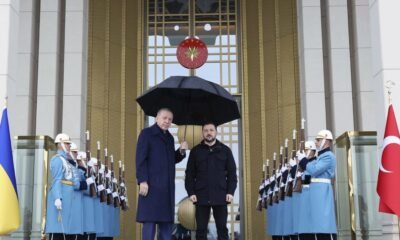
 Politics2 days ago
Politics2 days agoErdoğan to visit Ukraine, free trade on agenda: Envoy
-
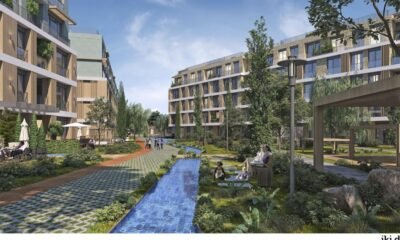
 Economy22 hours ago
Economy22 hours agoPublic land formula essential for transformation
-
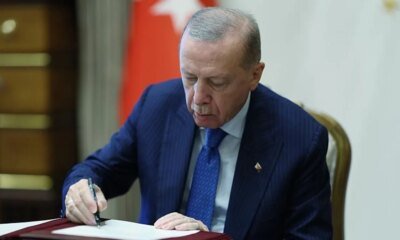
 Daily Agenda1 day ago
Daily Agenda1 day agoThe Chief of General Staff changed with the age decision
-
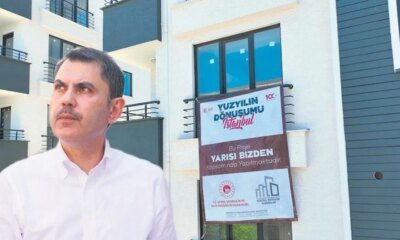
 Daily Agenda2 days ago
Daily Agenda2 days agoHalf of us and hearts are comfortable nests peaceful
-
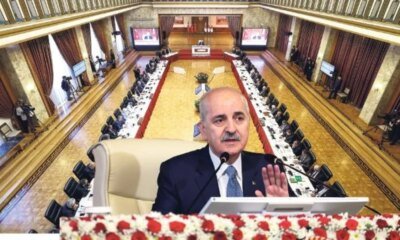
 Daily Agenda2 days ago
Daily Agenda2 days agoWe are on the verge of a historical period – Breaking News
-
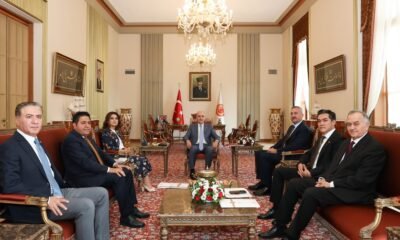
 Politics2 days ago
Politics2 days agoCommittee scheduled to chart road map for terror-free Türkiye
-
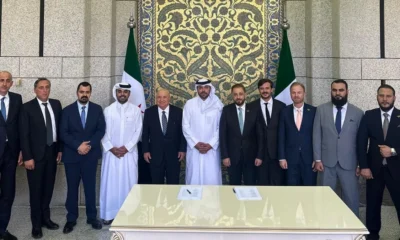
 Daily Agenda23 hours ago
Daily Agenda23 hours agoKalyon Construction and Cengiz Construction signature to Damascus International Airport! 4 billion dollars investment
-
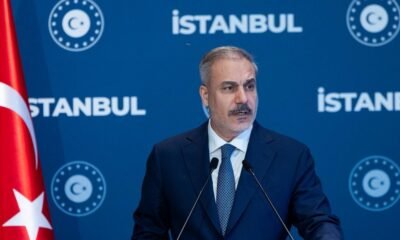
 Politics3 days ago
Politics3 days agoFM Fidan, Bayramov discuss regional issues in call




